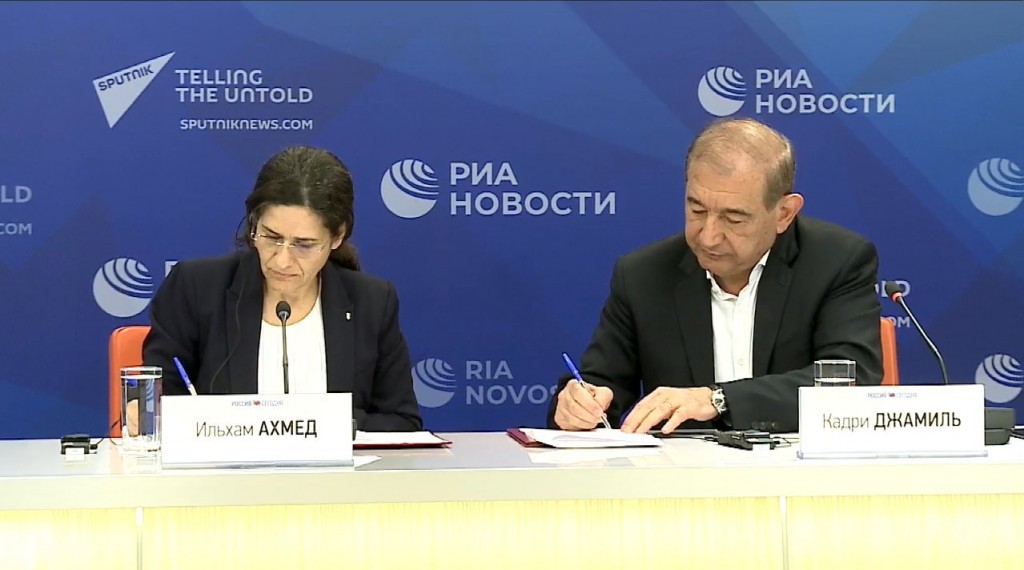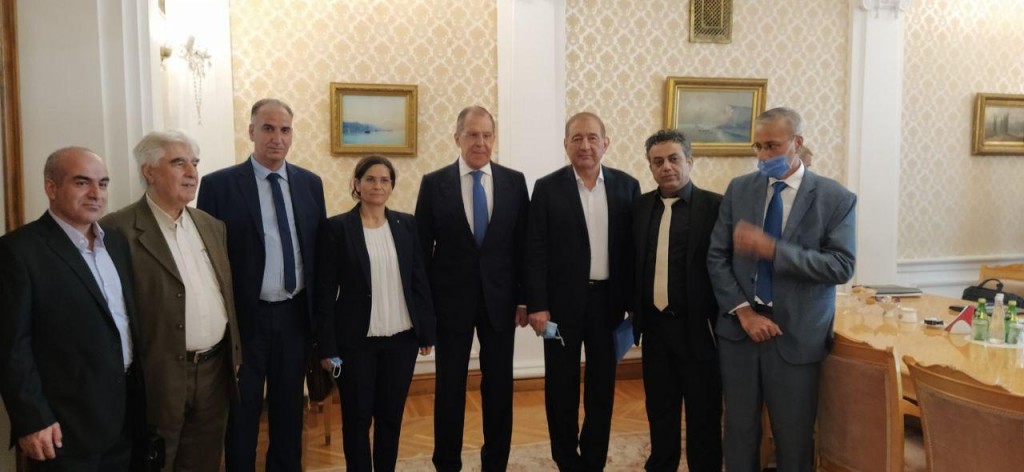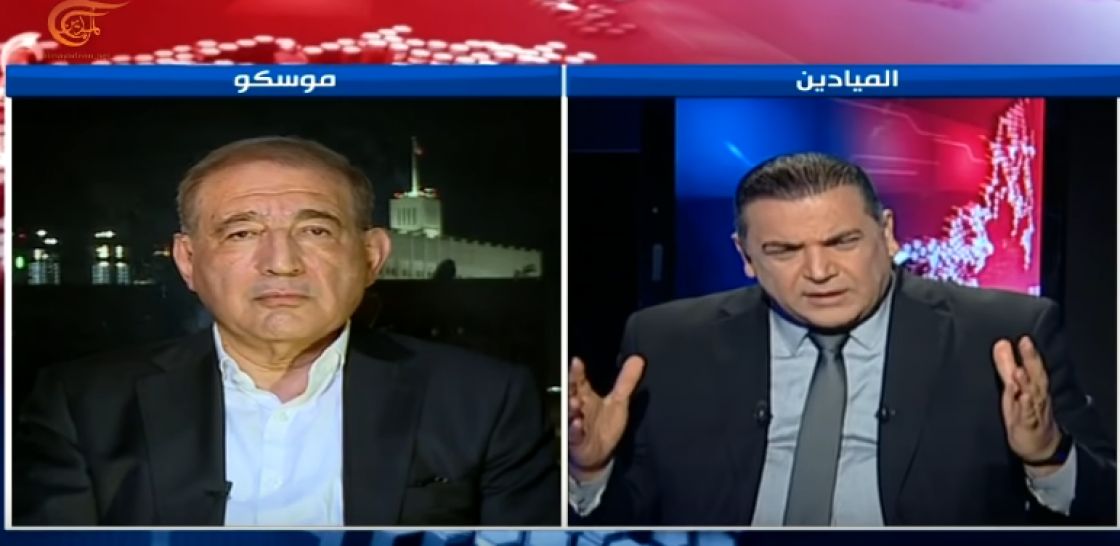- News & Activities
- Posted
Dr. Jamil to Al-Mayadeen: The Constitutional Committee Should Move to Damascus… The Syrian People’s Recognition is What We Care about
On Wednesday, 23 September 2020, Mr. Kamal Khalaf, a journalist, hosted on his program “The Game of Nations” on Al-Mayadeen Channel, the Secretary of the People’s Will Party and head of the Moscow platform, Dr. Kadri Jamil to talk about the latest developments in the political process and the situation inside Syria, as well as the details and prospects of the memorandum of understanding signed with the Syrian Democratic Council (SDC).
Below are excerpts from this interview...
In the introduction that I just read, the word “ambiguity” was repeated twice, when we talked about the area east of the Euphrates and Idlib in northern Syria. Do you share this vision with us, or is the picture clearer to you regarding these areas?
Jamil: Whoever knows the tangible global, regional, and local reality, knows that there is no ambiguity; everything is clear. However, there are those who want to muddy the waters so that there is ambiguity. For us, things are quite clear, and the direction of movement is clear. What is not clear is the speed at which things are going in this direction because that depends on many factors. For us, in the Moscow Platform – of which I am the only member present in Moscow, while our Platform is present in all parts of Syria – it is clear that things are moving towards the implementation of UNSCR 2254, which first means preserving the Syria’s territorial integrity, and secondly giving the Syrian people their right to self-determination regarding their political future. These things are clear.
The Americans are playing poker, and you know that poker players usually cheat, and the player who has bad cards gives signs that everything is good, despite having nothing good going on for him. So, I hope that we are not carried away by Western and US media statements. In fact, if you look at a graph of US military presence in the region and not only in Syria, it is going down. Thus, things will reach their logical end.
US retreat is not a matter of good morals, there is a weakness and a deep crisis that requires regression, and the features of the conflict within the US administration between two directions is tangible and visible. The first is what we call the “globalist”, which seeks to expand, and which represents the US financial capital linked to the global and the Zionist primarily. The second trend is “regressive”; if we examine US history during the past two hundred years, we find that the tendency towards expansion and regression used to follow one another by 50-70 years, today the time has come for regression.

The latest news talks about the disreputable and notorious “James Jeffrey” visiting the areas east of the Euphrates; reports say that he is arranging for autonomous rule there, and that he discussed the idea of training police forces with the help of the French. Doesn't this talk hit the core of what you reached with the Autonomous Administration there?
Jamil: When we talk about regression, it is dictated by objective circumstances, not good morals or values. There is a compelling circumstance and the tendency is moving in a regressive direction, and the effects of this is what we are seeing everywhere. This does not mean a change in the nature of US imperialism, but rather a change of tactics that will allow the existence of margins for the peoples who are struggling to achieve their aspirations of freedom and justice.
So, you are heralding the imminence of US withdrawal from the Syrian file?
Jamil: Do you remember Vietnam, Afghanistan, Iraq? What was the size of US forces? When the expansionary trend was dominant… was it not hundreds of thousands? It is hundreds of times more than the military presence in Syria.
Today, there are a few hundred in Iraq and Syria. Isn’t this worth thinking about? Have they become ascetic in deploying their military forces? Or are there objective circumstances that compel them to do so? I think the latter.
Regarding James Jeffrey, what he said in the meeting according to my information can be summarized as follows:
- We will not allow the Turks to repeat what happened in Ras al-Ain and Tal Abyad, or to acquire new territories, under penalty of sanctions.
- Acceleration of the Kurdish-Kurdish agreement, because we are moving toward a new and strong opposition outside the framework of the (Syrian) Coalition.
- We are not working to give Kurds the rule, and we are with the unity of Syria while preserving Kurds’ rights.
- Disengagement with the PKK.
- The above are a US strategy, which has nothing to do with a US president leaving or taking office.
This information is identical in the strategic sense with the strategic analysis that I gave earlier. So, let us remember the words of James Jeffrey – who is “all over the place” in the media – about his mission to drown the Russians in the Syrian quagmire, and also saying that there is no need for large forces to achieve this goal, rather we need forces that can be part of a simple mathematical problem. Meaning, 400-500 people are enough to jump around and creating the atmosphere of the chaos that they want to be creative, but destructive, as experiences in Iraq and Syria have proven.
You mentioned a point from what Jeffrey said, which is: We will face opposition from outside the (Syrian) Coalition – who does Jeffrey mean?
Jamil: How should I know? Ask him! Just like you, I am surprised. However, this will become clearer in the coming days, and let Jeffrey officially deny saying this in the media, you know, keeping up with the liar till the end.

Has Jeffrey challenged this document or not?
Jamil: There is no doubt that he is trying to abort this document; not likely though, because it reflects an objective necessity. Its formulation was not an easy matter, but it proved that when Syrians decide to agree, they are capable of doing so. A little compromise, without either side giving up its independence, while rounding the corners to reach consensus. The problem is that we in Syria have not learned the art of compromise. We are used to the one-party mentality, the one-party virus, and hegemony.
This also exists within the opposition. The (Syrian) Coalition is trying to impose itself on everyone. Jeffrey made a media buzz to influence the development following of the document, but I do not think he will able to. All Jeffrey put forth is just intentions, nothing real or practical. He is mediating among different Kurdish sides, and I have not seen tangible progress in this yet, although we hope to see any two Syrian sides reaching agreements. However, the agreement sponsored by Jeffrey so far has not achieved tangible progress, and I doubt that he had serious intentions to make any progress. What he is doing is trying to further complicate things.
What is the relationship between the signing of the memorandum and dialogue with the government?
Jamil: The folks at SDC have proven that they are understanding and not adventurous, and they are open for dialogue. The government in Damascus should grasp this moment and start serious talks with them to resolve matters. Although, in my personal opinion, the pending matters between the SDF/SDC and the Syrian government should be resolved on the negotiations table with all Syrians, and I doubt that they can reach an agreement without the participation of the main parts of Syrian society and the Syrian political forces in this process. Hence the importance of starting a comprehensive Syrian dialogue to implement UNSCR 2254, one of the aspects of which is the constitutional committee.
Did they give you a justification during the discussions for their signing of oil agreement with the US oil company unilaterally without going back to any other side, neither the Syrian government nor anyone else?
Jamil: I didn’t bother asking them about it because I know the truth. The truth is that this oil is being shared among the Americans, the Turks, the Syrians, and SDF. The US takes 30%, Damascus 30%, the Turks 20%, and SDF 20%. SDF/SDC are the only ones we know where they spend the oil revenues. They spend it on the needs of the area they control, which contains twice the number of its usual residents. While the rest goes entirely to Turkey, the Americans, and the Syrian mafia. This is “stolen money marking its thieves”. So, the problem is not whether they signed or not; the problem is that this oil, in light of the current crisis and the rupture among Syria’s regions, is wasted. It is not in the interest of the Syrians, who today need a morsel of bread and a bottle of diesel… that this oil is being looted. So, I say that there is no solution but a political solution to restore links among the various Syrian regions so that the good of the country will benefit its people.

When will you go back to Damascus?
Jamil: With the political solution, and it is a lot closer because the objective conditions for it have ripened, they have ripened too much. I do not see the political solution as a division and redistribution of power and influence, that is not the case. The political solution means lifting of sanctions, ending the siege, reconnecting the regions of Syria with each other, and starting the process of mass production again within one economic space. I understand that a political solution means that the Syrians agree on a common vision of their future within minimal common grounds at least.
This gives guarantees to all Syrians abroad that they will return to the country, whether they are suffering from hunger and cold in the camps, or they are politicians interested in returning to the country. At that time, the country will be open and ready to embrace everyone without preconditions, and able to secure the conditions for political action and normal development for all.
I am the only one from the Moscow Platform abroad, unlike the other oppositions who are all abroad and have no one inside. I was instructed by our comrades to stay abroad because the center of gravity of the political process has moved outside Syria due to the internationalization of the crisis, and my role here is to follow up on this issue. We are exerting our efforts in this direction and you can see the results of this process.
You were the first to demand moving the work of the Constitutional Committee to Damascus, are you still demanding this?
Jamil: The membership of our comrade Mohannad Dlykan was revoked from the Syrian Negotiations Commission (SNC) and his membership in the constitutional committee was suspended because he spoke a “blasphemy” at the constitutional committee meeting when he said, “The Committee must be moved to Damascus.” We are now nominally on the Committee, but our membership is frozen. We disagreed with the SNC on this issue, and they punished us for asking to go to Damascus! But this is not the essence of the matter. I believe that the negative stance taken by the Coalition and part of the Syrian opposition towards us is a superficial, naïve, and vulgar stance because we demanded to return to Damascus. Why did we demand to return to Damascus?
I tell you honestly: the demand to return to Damascus was a test balloon for the regime, if it really wanted a constitutional committee and someone from an opposition side came and said that we want to transfer the meetings to Damascus, the regime is supposed to grab the idea and work to implement it. But the big surprise to us was that the regime ignored the suggestion and reacted very coldly toward it.
Now, the Constitutional Committee is running around in a vicious circle, and the indicators that I have today and yesterday about the next round do not bode well. I say that if we want the Constitutional Committee to work and move forward, it must work in Damascus, among the Syrian people in front of cameras and on television screens, let the people know each side and what it says. This is the only solution.
The UN has spent millions of dollars on the Constitutional Committee without success. It would have been better if this amount had been spent on food, beverage, and clothing for the Syrian people. I think moving the Committee to Damascus is a major political act and the UN can give adequate political and security guarantees, and health ones now in light of the Coronavirus, and this will accelerate the work of the Committee and make it reach the expected results as soon as possible, which will create the appropriate grounds for the political solution to move forward.

You said that the Constitutional Committee is running around in a vicious circle, and there are no results yet. A little while ago, you said that the political solution is very close. If the Committee that forms the ground for a political solution is running around in a vicious circle, on what basis do you have indications that a political solution is imminent?
Jamil: I have no information. I have intuition, there is eyesight and there is insight. The contradictions and problems in Syria have reached their limits, and without a political solution, no problem can be solved. The Constitutional Committee must proceed as the key to a political solution, and the antidote to the Committee’s functioning is to transfer its work to Damascus. I am telling you that it is shameful for the Syrian constitution to be written in Geneva. Is it conceivable that Syria, whose constitution was the first constitution in the Arab world, and which participated in writing constitutions for other Arab countries, that its constitution is written in Geneva?
I want to ask those who will write the Syrian constitution how they will look into the eyes of their children and grandchildren and tell them that they wrote the Syrian constitution in Geneva! The Syrian constitution must be written in Syria. This is a matter of national dignity, sovereignty, and morals. Therefore, today I raise my voice loudly, calling for the transfer of the Committee’s work to Damascus, because in Damascus no one will be able to escape this important task, from this side or the other. The vicious circle in which the Constitutional Committee is going around will eventually be broken, and it must be broken.
What role will you play in the future? The spotlights that are on you today say that there is a role offered to you, is there such a thing?
Jamil: I do not see spotlights on me except for the studio lights in which I am sitting now, and they are raising the temperature. The lights that matter to me are those of the Syrian people. What is important to me is that the Syrian people pay attention to what we say and believe what we say, and to walk forward together to solve the crisis. I am fundamentally against personalizing any problem and any cause. I don’t know what my role will be in the future. I am a member of a political party (the People’s Will Party), and a member of the Front [for Change and Liberation]. I do not do work based on my personal ideas, but I adhere to a certain discipline. Therefore, I will adhere to what the Party and the Front will decide, and this depends on the circumstances, and the proportionalities of forces, and the subsequent development.


